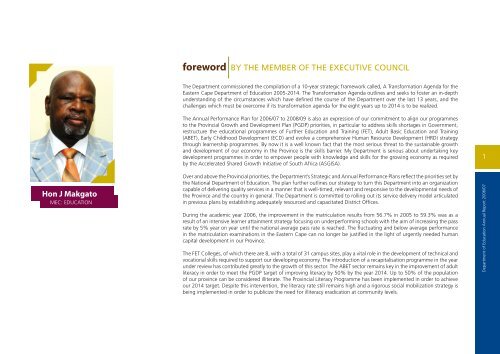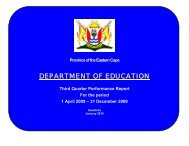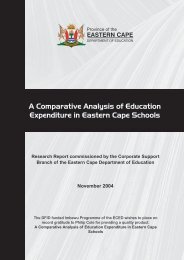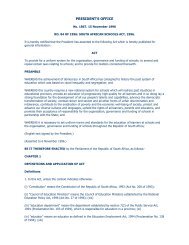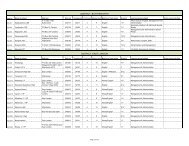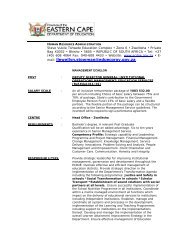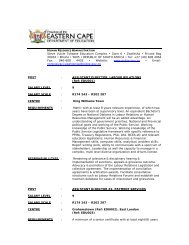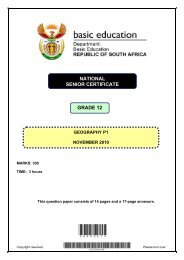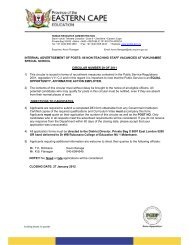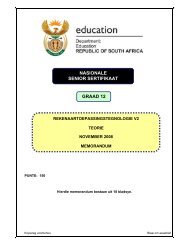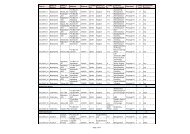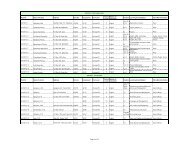Annual Report 2006/2007 - Department of Education
Annual Report 2006/2007 - Department of Education
Annual Report 2006/2007 - Department of Education
Create successful ePaper yourself
Turn your PDF publications into a flip-book with our unique Google optimized e-Paper software.
foreword BY THE MEMBER OF THE EXECUTIVE COUNCIL<br />
The <strong>Department</strong> commissioned the compilation <strong>of</strong> a 10-year strategic framework called, A Transformation Agenda for the<br />
Eastern Cape <strong>Department</strong> <strong>of</strong> <strong>Education</strong> 2005-2014. The Transformation Agenda outlines and seeks to foster an in-depth<br />
understanding <strong>of</strong> the circumstances which have defined the course <strong>of</strong> the <strong>Department</strong> over the last 13 years, and the<br />
challenges which must be overcome if its transformation agenda for the eight years up to 2014 is to be realized.<br />
The <strong>Annual</strong> Performance Plan for <strong>2006</strong>/07 to 2008/09 is also an expression <strong>of</strong> our commitment to align our programmes<br />
to the Provincial Growth and Development Plan (PGDP) priorities, in particular to address skills shortages in Government,<br />
restructure the educational programmes <strong>of</strong> Further <strong>Education</strong> and Training (FET), Adult Basic <strong>Education</strong> and Training<br />
(ABET), Early Childhood Development (ECD) and evolve a comprehensive Human Resource Development (HRD) strategy<br />
through learnership programmes. By now it is a well known fact that the most serious threat to the sustainable growth<br />
and development <strong>of</strong> our economy in the Province is the skills barrier. My <strong>Department</strong> is serious about undertaking key<br />
development programmes in order to empower people with knowledge and skills for the growing economy as required<br />
by the Accelerated Shared Growth Initiative <strong>of</strong> South Africa (ASGISA).<br />
<br />
Hon J Makgato<br />
MEC: EDUCATION<br />
Over and above the Provincial priorities, the <strong>Department</strong>’s Strategic and <strong>Annual</strong> Performance Plans reflect the priorities set by<br />
the National <strong>Department</strong> <strong>of</strong> <strong>Education</strong>. The plan further outlines our strategy to turn this <strong>Department</strong> into an organization<br />
capable <strong>of</strong> delivering quality services in a manner that is well-timed, relevant and responsive to the developmental needs <strong>of</strong><br />
the Province and the country in general. The <strong>Department</strong> is committed to rolling out its service delivery model articulated<br />
in previous plans by establishing adequately resourced and capacitated District Offices.<br />
During the academic year <strong>2006</strong>, the improvement in the matriculation results from 56.7% in 2005 to 59.3% was as a<br />
result <strong>of</strong> an intensive learner attainment strategy focusing on underperforming schools with the aim <strong>of</strong> increasing the pass<br />
rate by 5% year on year until the national average pass rate is reached. The fluctuating and below average performance<br />
in the matriculation examinations in the Eastern Cape can no longer be justified in the light <strong>of</strong> urgently needed human<br />
capital development in our Province.<br />
The FET Colleges, <strong>of</strong> which there are 8, with a total <strong>of</strong> 31 campus sites, play a vital role in the development <strong>of</strong> technical and<br />
vocational skills required to support our developing economy. The introduction <strong>of</strong> a recapitalisation programme in the year<br />
under review has contributed greatly to the growth <strong>of</strong> this sector. The ABET sector remains key in the improvement <strong>of</strong> adult<br />
literacy in order to meet the PGDP target <strong>of</strong> improving literacy by 50% by the year 2014. Up to 50% <strong>of</strong> the population<br />
<strong>of</strong> our province can be considered illiterate. The Provincial Literacy Programme has been implemented in order to achieve<br />
our 2014 target. Despite this intervention, the literacy rate still remains high and a rigorous social mobilization strategy is<br />
being implemented in order to publicize the need for illiteracy eradication at community levels.<br />
<strong>Department</strong> <strong>of</strong> <strong>Education</strong> <strong>Annual</strong> <strong>Report</strong> <strong>2006</strong>/07


